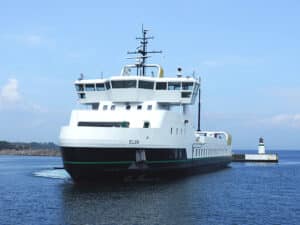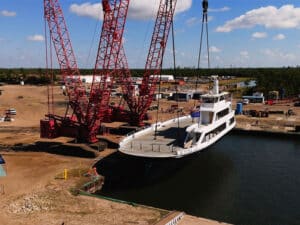
Baleària to operate three ferries exclusively on bio-LNG
Written by Nick Blenkey
Photo:Baleària
Spanish ferry operator Baleària has started operating three of its vessels only on bio-LNG (biomethane). It is now using the renewable fuel on all routes operated with the fast ferry Margarita Salas and the ferry Abel Matutes, which connect Barcelona-Alcúdia-Ciutadella, as well as on the Rusadir, which connects Malaga-Melilla,
Baleària, which has become the first ferry operator in Europe to receive International Sustainability and Carbon Certification (ISCC) accreditation, says that its use of bio-LNG produced from animal waste generates a negative carbon footprint, as its production captures methane from the atmosphere.
Baleària is sourcing its bio-LNG from Enagás, whose plants in Huelva, Barcelona and Cartagena, Spain,. use a process that makes bio-LNG which is CO2-neutral, with a negative carbon balance and produces greenhouse gas (GHG) savings of over 200% compared to traditional fossil fuels
The company has procured 132 gigawatt-hours (GWh) of bio-LNG from Enagás, which will allow the three ships to sail emissions-free until December 2025. This volume, supplied over just four months, is equivalent to 13% of the LNG consumed by Baleària’s entire gas-powered fleet in 2024.
Thanks to its use of this fuel, Baleària is not only eliminating its carbon footprint on the Barcelona–Alcúdia–Ciutadella and Malaga–Melilla routes but is also generating a globally positive carbon balance.It says that the use of this biofuel between September and December will prevent the emission of 80,300 tonnes of CO2, the annual equivalent of taking 153,500 cars off the roads or planting 160,650 trees.
Biomethane, produced from livestock waste, captures and recovers methane that would otherwise be released into the atmosphere, transforming it into useful energy for shipping. The biomethane supplied is converted into bioLNG thanks to the pioneering conversion service at Enagás’ regasification plants, which is already up and running in Huelva, Barcelona and Cartagena. This process makes bioLNG a key energy solution: CO₂-neutral, with a negative carbon balance and greenhouse gas (GHG) savings of over 200% compared to traditional fossil fuels
“The use of bio-LNG on our regular routes represents a real and verifiable step forward in our commitment to achieving net-zero emissions,” says Baleària CEO Georges Bassoul. “The investments in our fleet that we have made in recent years to equip it with dual engines allow us to use this renewable fuel, which prevents the release of greenhouse gases and accelerates decarbonization.’
ISCC certification: Baleària’s ISCC EU certification, recognized by both the European Commission and the international community, guarantees the traceability and sustainability of the biofuels and other renewable energi: es used by a company in its operations. This is possible thanks to the Proof of Sustainability (PoS) system, which certifies their origin, volume and characteristics, including emissions savings.
The ISCC certification joins other environmental certifications already held by Baleària, such as the Green Maritime Europe label.




